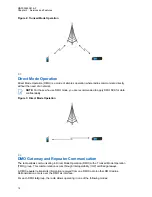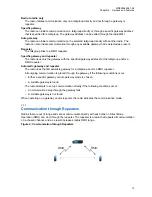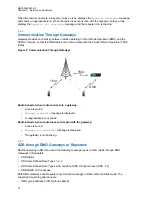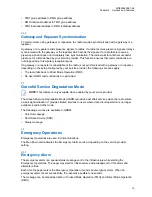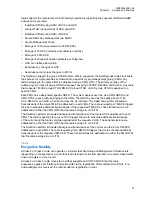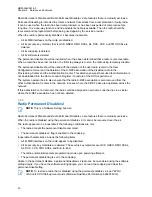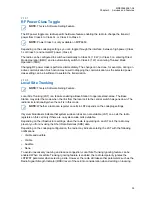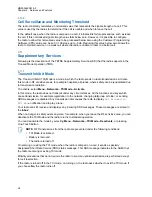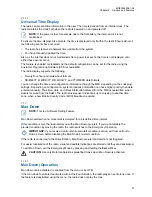
Security Feature
Mode
Security
Class 1
Security
Class 2
Security
Class 3
Security
Class 3G
GCK AIE
N/A
N/A
N/A
Mandatory
NOTE:
In the current release, the radio does not support the following security features:
• Radio initiated authentication.
• Support for TEA4.
• Explicit authentication during Dynamic Group Number Assignment (DGNA).
• OTAR in foreign network.
• GCK AIE in foreign network.
2.8.4.1
Clear Radios (Class 1)
A radio can be configured as a clear radio. In such case, the radio identifies itself in registration as a
Security Class 1 radio and does not support encryption. A Security Class 1 radio does not contain any
encryption algorithms in its software.
2.8.4.2
Static Cipher Key Encryption (Class 2)
The radio supports static Air Interface Encryption (AIE) using a set of up to 32 Static Cipher Keys
(SCK) shared by the Switching and Management Infrastructure (SwMI) and all authorized radios.
The radio then determines which static keys to use based on the SCK Number (SCKN) and SCK
version number (SCK-VN) broadcast by the SwMI. A radio can be configured to support static key
encryption. In such case, it identifies itself in registration as a Security Class 2 radio, and attempts
to negotiate Security Class 2 encryption. Each radio then uses either the TEA1 or the TEA2 (TEA 3
for Asia and Pacific) Key Stream Generator (KSG) algorithm. Each radio contains only one of those
algorithms in its software.
When Security Class 2 Encryption has been negotiated, encrypted PDUs are encrypted using SCK.
In Direct Mode Operation (DMO), the system manager may choose the SCK and the key may be
distributed from the Trunked Mode Operation (TMO) SwMI using the Over-the-Air Rekeying (OTAR)
mechanism or provided manually using Key Variable Loader (KVL).
2.8.4.3
Derived Cipher Key and Common Cipher Keys Encryption (Class 3)
Derived Cipher Key and Common Cipher Keys Encryption (DCK/CCK) are required to prevent over-
exposure of key material. Existing encryption systems use Static Cipher Keys (SCK), where one key is
used for all radios and all communications.
Key material is often exposed and SCK logistics of changing keys consist in programming all radios
and Base Stations. DCK is used for individually addressed TM-SDU (Service Data Unit). DCK/CCK
encryption provides Derived Cipher Key (DCK) for uplink (from the radio to the BTS) communication
and Common Cipher Key (CCK) for downlink (from the BTS to the radios) group communication. The
DCK is derived from either the one way or mutual authentication process and the CCK is received
during registry.
The radios supporting the dynamic key encryption identify themselves to the system as Class 3 radios
during registry and attempt to negotiate Class 3 encryption. A Class 3 radio supports group addressed
MN003465A01-AF
Chapter 2 : Services and Features
25


